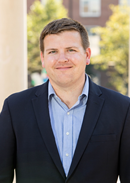
Seamus Hughes
Deputy Director of the Program on Extremism, George Washington University
Seamus Hughes is the Deputy Director of the Program on Extremism at George Washington University’s Center for Cyber & Homeland Security. He is a recognized expert on homegrown violent extremism and countering violent extremism (CVE).
Hughes previously worked at the National Counterterrorism Center, serving as a lead staffer on the U.S. government’s efforts to implement the national CVE strategy. He regularly led engagements with Muslim American communities across the country, provided counsel to civic leaders after high-profile terror-related incidents, and met with families of individuals who joined terrorist organizations. Hughes created a groundbreaking intervention program to help steer individuals away from violence through non-law enforcement means and worked closely with FBI Joint Terrorism Taskforces, Fusion Centers, and U.S. Attorney Offices. He has briefed numerous foreign governments and helped coordinate the 2015 White House Summit on CVE.
Prior to NCTC, Hughes served as the Senior Counterterrorism Advisor for the U.S. Senate Homeland Security and Governmental Affairs Committee. He organized over a dozen congressional hearings on the threat of homegrown violent extremism and led fact-finding delegations to the various European and Middle Eastern countries. He authored two reports for the Senate: “A Ticking Time Bomb: Counterterrorism Lessons from the U.S. Government’s Failure to Prevent the Fort Hood Attack” and “Zachary Chesser: A Case Study in Online Islamist Radicalization and Its Meaning for the Threat of Homegrown Terrorism.”
Hughes was also a lead congressional investigator, uncovering evidence of widespread government funding of inaccurate counterterrorism training, which directly lead to the creation of federal standards. He has authored numerous legislative bills, including sections of the 9/11 Commission Recommendations Act and the Special Agent Samuel Hicks Families of Fallen Heroes Act. He is a graduate of the University of Maryland and the recipient of National Security Council Outstanding Service and two NCTC Director’s Awards for outstanding service.